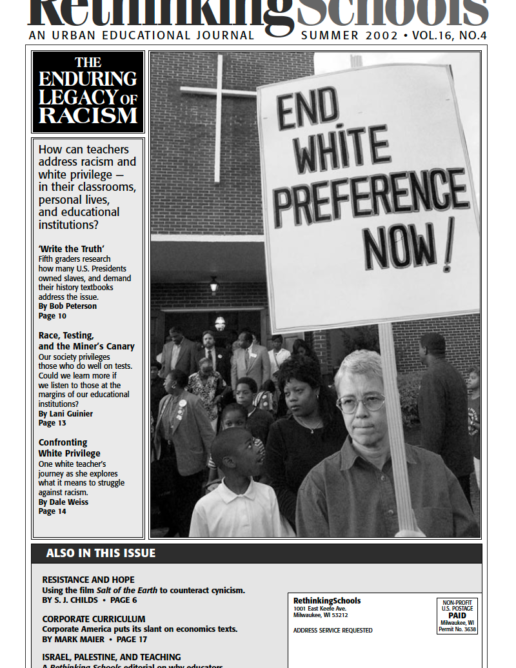What the American Flag Stands For
By Charlotte Aldebron
The American flag stands for the fact that cloth can be very important. It is against the law to let the flag touch the ground or to leave the flag flying when the weather is bad. The flag has to be treated with respect. You can tell just how important this cloth is because when you compare it to people, it gets much better treatment. Nobody cares if a homeless person touches the ground. A homeless person can lie all over the ground all night long without anyone picking him up, folding him neatly and sheltering him from the rain.
School children have to pledge loyalty to this piece of cloth every morning. No one has to pledge loyalty to justice and equality and human decency. No one has to promise that people will get a fair wage, or enough food to eat, or affordable medicine, or clean water, or air free of harmful chemicals. But we all have to promise to love a rectangle of red, white, and blue cloth.
Betsy Ross would be quite surprised to see how successful her creation has become. But Thomas Jefferson would be disappointed to see how little of the flag’s real meaning remains.
Testing the Limits of Privacy
By Wendy Moses
Where does one draw the line? How far into students’ privacy will administrators delve? Where in the U.S. Constitution does it say that publicly schooled students are exempt from its protections and guarantees?
The issue of mandatory drug testing raises these perplexing questions, and many districts are anxiously awaiting the Supreme Court’s ruling on its legality, which likely will not be announced until this summer. [In April, the Court heard oral arguments on the constitutionality of a policy in Tecumseh, Okla., that mandated that all students pass drug tests before taking part in any extracurricular activity.]
Hopefully, the court will not extend its 1995 6-3 decision upholding the legality of mandatory drug testing for athletes.
If it does so, the justices may as well justify mandatory drug tests for anyone enrolled in school because such a high proportion of students involve themselves in at least one, if not more, extracurricular activity. Without some type of assistance program, a positive drug test would hurl a student further into the “drug culture” that Justice Anthony M. Kennedy expressed contempt for.
To expel students from their choice extracurricular activities – in many cases a passion for art, debate, or sports – leaves them out on the streets after school instead of in a controlled environment. This only worsens the problems presented by the drug world.
School provides a place of refuge, a haven where any student should be welcomed and encouraged to pursue positive influences and experiences.
Conservative justices want to keep “the druggies” out of school, but this viewpoint exposes their naiveté of the situation. The justices should want to keep them in school where administrators, teachers, and extracurricular programs can guide the students to a less destructive and more productive path.
Justice Stephen Breyer compared drug testing to using metal detectors to keep guns off campus, emphasizing that in neither case is there individualized suspicion. The difference is that a student with a deadly weapon poses a threat to everyone else in the building, but a student on drugs generally only poses a threat to his or her personal well being.
The court’s 1995 opinion on drug testing for athletes was based heavily on the fact that engaging in strenuous activity while under the influence of illegal substances can cause deleterious effects and even death.
Though the tests remain an invasion of privacy, this point is at least justifiable. What, though, is potentially dangerous about an extracurricular activity not involving great physical exertion?
Nothing. There is no justification for randomly testing a student devoting time to a respectable activity.
The Supreme Court has affirmed the right to privacy, yet it has a history of failing to uphold students’ privacy rights. This is its opportunity to break away from precedent and prove that it doles out justice rather than supporting infringement into the personal lives of citizens.

